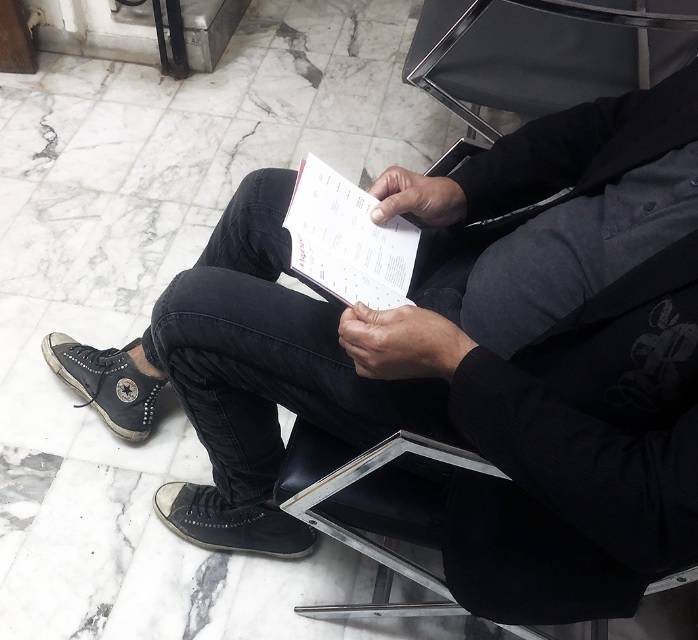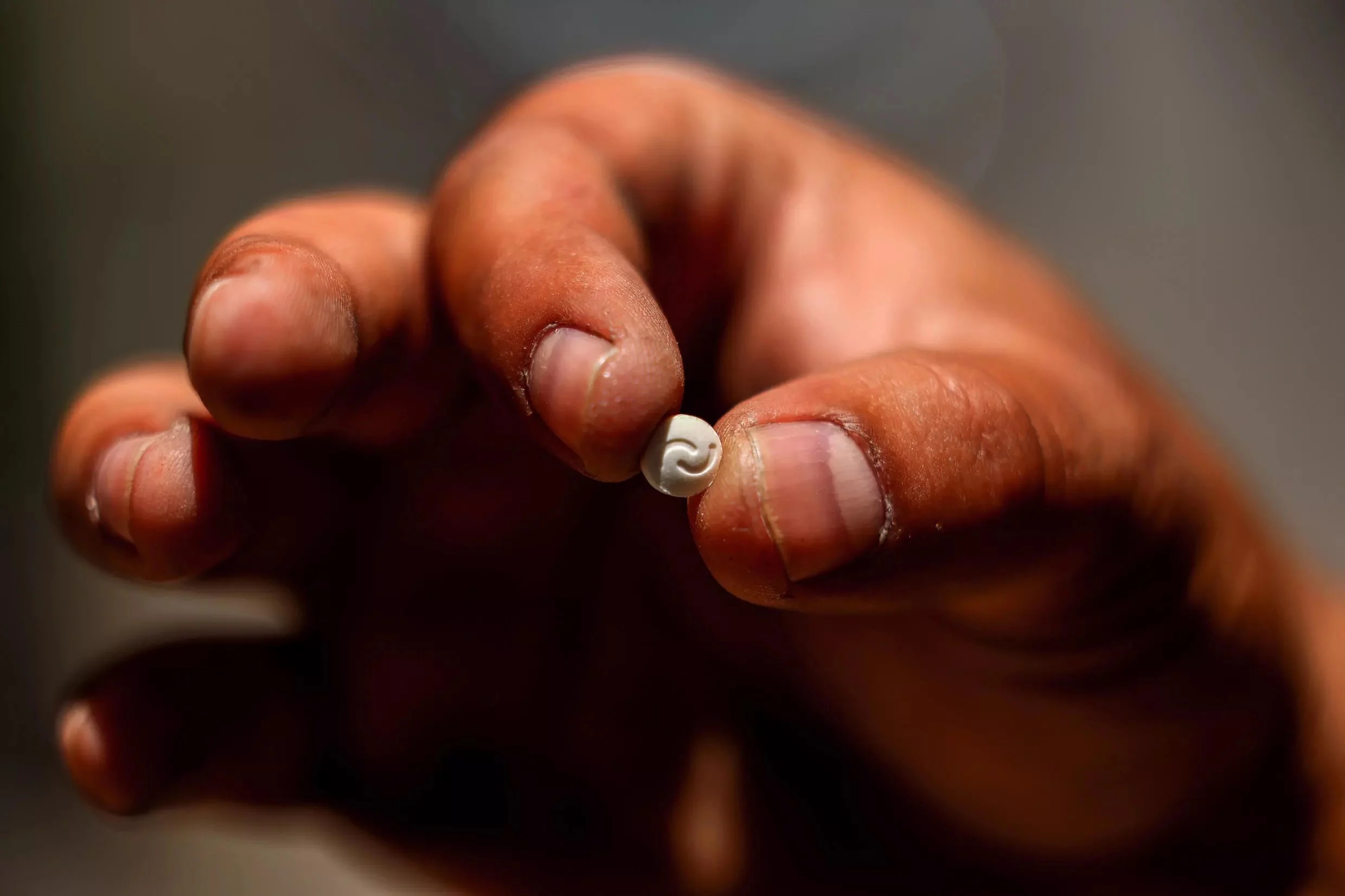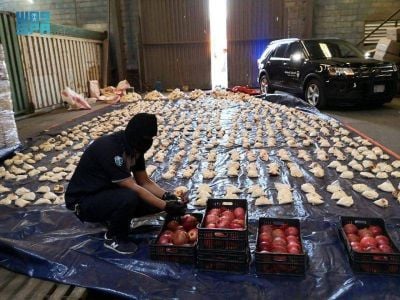
A patient awaits treatment at the Skoun addiction center. (Credit: Instagram/Skoun)
At the drug rehabilitation center of the NGO Skoun, located within Beirut’s Rafic Hariri University Hospital, recovering drug users wait outside the premises for their weekly psychotherapy appointments.
The center treats various types of addiction. Recently, that has included increased cases of crystal meth and Captagon addition— drugs that have become more accessible in Lebanon due to local and regional production and affordable prices. This also comes amid an economic crisis that has been plaguing the country over the past three years.
A survey conducted in 2021 by Skoun and the EU already revealed that these narcotics were being consumed by some people aged 18-35 in the aftermath of the COVID-19 pandemic and the Beirut port explosion.
The study found that 92 percent of the 3,000 respondents used tobacco and cannabis, 90 percent consumed alcohol, 42 percent cocaine, 20 percent amphetamine and 16 percent methamphetamine.
“Crystal meth was only recently introduced on the Lebanese market. Prior to 2018, no one contacted us for detox treatment for this substance. Today, 25 people are being treated at our center for addiction to crystal meth,” Tayana Sleiman, Skoun’s director, tells L’Orient-Le Jour.
Sleiman explains that this narcotic emerged on the market during the pandemic when drug smuggling slowed down due to confinement measures.
 A Captagon pill. (Credit: Joseph Eid/AFP)
A Captagon pill. (Credit: Joseph Eid/AFP)
“Cooking crystal meth is relatively easy, so local production began to develop during the lockdown, which was noticed through our fieldwork,” Sleiman says.
Recent reports show that Captagon is primarily produced in Syria, with a few local production labs in Lebanon.
According to Sleiman, a significant amount of Captagon consumption has been observed in the border areas wth Syria, as well as in Lebanon’s north and the Bekaa Valley.
While cannabis is widely cultivated in Bekaa and continues to be consumed in Lebanon, Sleiman notes that it is considered less harmful by users since it has been legalized in several countries.
“Anything consumed excessively can become dangerous and quickly lead to substance abuse,” Sleiman warns.
Captagon for a pittance
Skoun relies on the number of people who seek detox treatment in their centers, as well as their fieldwork, to provide data on drug addiction.
The organization, however, does not have precise figures on drug addiction as there is no national data available on the subject in Lebanon.
While there appear to be rising numbers of patients for crystal meth and Captagon addiction seeking treated at Skoun, this does not necessarily mean that these substances are the most commonly consumed.
“Patients seek treatment for addiction to these drugs as their harmful effects show quickly. This is in contrast to cannabis users, who may smoke for several years before noticing the harmful effects of their addiction,” Sleiman explains.
The Jeunesse Anti Drogue (JAD) association has also reported an increase in the consumption of crystal meth and Captagon in recent months.
The association’s director, Joseph Hawat, notes that the production cost of a Captagon pill is $0.17 (LL17,000 at parallel market rate), but it is sometimes sold for less than this price, at LL10,000 or a maximum of LL20,000.
Hawat adds that he has noticed an increase in the consumption of crystal meth, particularly in the context of some sexual practices, but he was unable to provide specific figures.
Cocaine use, meanwhile, is decreasing due to its high price, which ranges between $70 and $80 per gram, Hawat says.
An increase in consumption?
Has drug use really increased in Lebanon in recent years due to the ongoing crisis, despite the lack of official data?
According to Denise Fares, a psychotherapist at Skoun, people who lack resources or prospects and do not know how to deal with stress are more likely to resort to drug use as a way to escape or cope with their difficult situations.
Sleiman, Skoun’s director, says there has been a rise in the number of patients seeking treatment over the past three years. She says she cannot confirm whether this signifies an overall increase in drug addiction.
“Our center can accommodate 550 people annually, and we operate at full capacity year-round. The same applies to other detox facilities. We are uncertain if this is due to higher drug usage,” she says.
Sleiman believes that many patients are turning to NGOs for treatment because they can no longer afford the fees charged by private hospitals.
Meanwhile, at JAD, which runs clinics in Jbeil and Jal al-Dib, Hawat reports that the number of individuals seeking addiction treatment “has quadrupled over the past three years.”
The Oum El Nour association, which also provides free detox treatments, has also seen a surge in demand, with “the calls received doubling since the beginning of 2022,” according to Lina Khoury, the association’s director of communications and program development.
“Those who are calling are people who ask for help or information to help a loved one,” she tells L’Orient-Le Jour.
Khoury believes that “the use of narcotics has increased since 2019,” due to “the practice of self-medication and the use of drugs to treat anxiety, insomnia, post-traumatic stress related to the Beirut explosion, or the recent earthquakes.”
Compromised treatment
While the crisis has led to the emergence of new drugs, it also poses a threat to detox treatments. The shortage of legal drugs in the country has affected opiate substitution treatments used for addiction treatment.
Rami*, a former drug user who has been treated by Skoun for eight years, fears not being able to continue his treatment. “I’m afraid of relapsing. I suffered a lot to get rid of drugs, and I don’t want to lose everything I have accomplished so far,” he says.
In his 30s, Rami had to reduce his dosages of opiate substitutes to ensure treatment continuity for everyone.
“At one point, opiate substitutes were unavailable in Lebanon. We had to adapt the treatments to this situation, which caused panic among our patients,” Fares says.
“We then explained to them how to manage the withdrawal symptoms that can result from this,” she adds, noting that the center no longer accepts heroin users for detoxification due to the unavailability of treatment because of the crisis.
At Oum El Nour, the lack of resources is also threatening the smooth running of operations.
The association is suffering financially due to the national currency depreciation and the lack of funding.
“Sometimes we don’t have enough food to offer our patients,” said Khoury, who adds that the association’s employees are barely making ends meet.
“Our salaries are worthless, and we don’t have enough resources. Mental health is not a priority for donors. The Ministries of Health and Social Affairs used to help us before the crisis, covering 60 percent of the cost of our care, but now we have no right to anything,” she adds.
*First name has been changed to protect his privacy.
This article was originally published in French in L'Orient-Le Jour. Translation by Sahar Ghoussoub.

